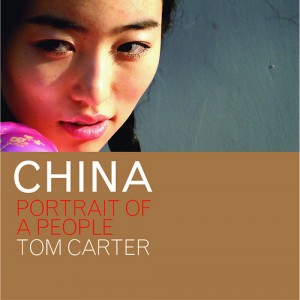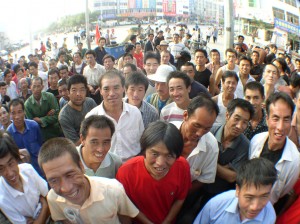The copy editor who wrote the headline for this must-read blog post in the NY Times should get a raise; it’s perfect.
We’ve all seen it: the grinning, dancing, singing ethnic minorities at government events and the televised craptaculars (go to the link to see my first-hand story about one such celebration). They are happy, innocent, contented and they live to sing and dance. They are so cute. And they are ubiquitous; as you flip through Chinese television channels it’s almost impossible not to find some example of happy minorities.
In China’s worst single outburst of ethnic violence in four years, 21 people died last month in the far western region of Xinjiang. But never mind that. According to the deputy governor of Xinjiang, Shi Dagang, the region’s Muslim Uighur population is far too busy treating guests “to meat and wine, with song and dance” to create any problems. In fact, Shi insisted to reporters this week, “The ethnic minorities are simple-hearted and honest, very kind and unaffected. They love guests.”
Chinese officials like to paint a picture of China as one big happy multicultural family. To that end, the state pushes the stereotype that ethnic minorities are little more than entertainers who sing and dance in bright costumes. Song-and-dance minority troupes regularly appear on state television — often singing in Mandarin rather than their native tongue.
….Unsurprisingly, Chinese media are less interested in showcasing genuine ethnic minority culture than in using portrayals of happy, traditional ethnic minorities as entertainment to boost Han rule. As Zang Xiaowei, a professor of Chinese studies at the University of Sheffield, explained to me this week, the state media aim to “strengthen Han ethnicity for nation-building purposes.”
We all know the advantages many of Chinese minorities enjoy under the CCP, the improvements in infrastructure, the right to more than one child. For the lucky few, their singing and dancing can lead to careers as professional performers. But the picture painted in the craptaculars is quite misleading. Minorities are still at the lower end of China’s caste system.
But when minorities attempt to venture outside the zones of tourism and entertainment, many hit a wall, a problem exacerbated in more restive areas like Tibet and Xinjiang.
A Uighur acquaintance of mine living in Beijing told me this week: “I went to college. I got a degree. I speak Mandarin. But if I apply for a job in Urumqi they don’t want me.’’ He was referring to the regional capital of Xinjiang, his native city. “I was born in the city and the other candidate is from somewhere 2,000 kilometers away. Why not me? Why him? Because he’s Han.”
The Hans hold all the advantages and get most of the good jobs in what can only be described as a caste system. Can you imagine a Uyghur or a Tibetan serving as Prime Minister, or even in the central committee? I can’t because for all the celebration of minority culture they aren’t really Chinese as are the Han. This image of happiness and joy is indeed “China’s Ethnic Song and Dance.” All the ethnic unrest is papered over, and what we see is a propaganda fantasy. The minorities’ relationship with the Han who administer them and go to work in their towns can only be described as a form of Apartheid. There are those with opportunities and power and then there are the minorities. And you’ll never see that on CCTV.
Update: This brief well-written essay underscores the extent to the government regulates the lives of Tibetans, often stripping away their most fundamental civil rights.


Comments